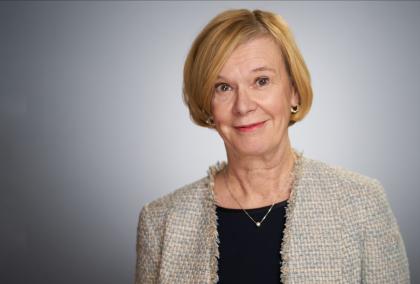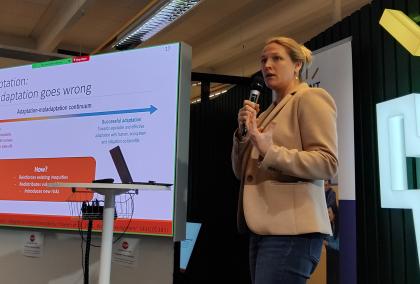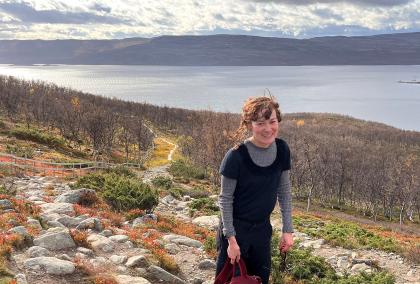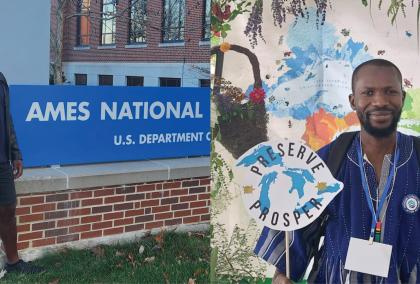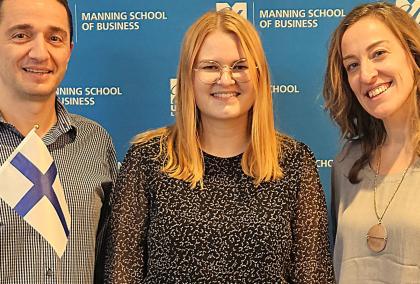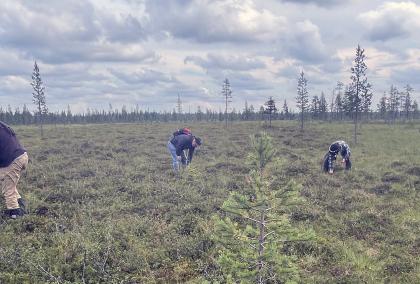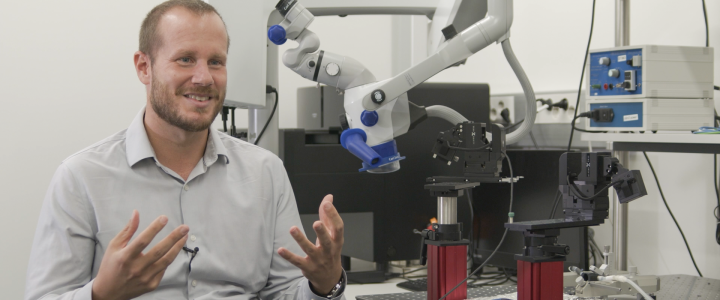

Nelson Totah has always been curious about the world – a lifelong trait that has led him on unexpected paths: from medicine to neuroscience, and from the U.S. to Europe and Finland, setting up his own research lab, during which a Fulbright Finland travel grant blossomed into a research breakthrough.
“When I was looking to start my own lab, I looked almost all over the world. And one of the places I applied was the University of Helsinki, with no idea what to expect,” he recalls. “But boy, am I glad I came here, because things kind of fell into place,” he says with a smile. “One reason I’m really glad I came to Finland is that fate landed me some interesting things to do, and I’ve been able to have what I think is an outsized impact.”
Now this enterprising academic has taken on yet another challenge: hands-on international science diplomacy, engaging face-to-face with U.S. policymakers to develop more support for Fulbright Finland’s professional exchange programs. “Finland is a relatively small country, population wise, that punches far above its weight in science, technology and I would even say in global affairs. It’s a country that shares a border with Russia, and that, like the United States, is an Arctic nation.”
“I think some of the most impactful things I’ve ever done with my life are being done in Finland, because I see the work I’m doing is strengthening the personal connections between the United States and Finland in a way that can really benefit not only both countries, but I believe it benefits the entire world. The work that people like Terhi Mölsä are doing with Fulbright in Finland can help reshape the world into a better place.”
From Medicine to Neuroscience
Nelson initially set out to study medicine at college, and indeed later qualified as an emergency medical technician and spent around a decade working with a disaster medical team. However, after taking some medical classes on the brain, he discovered his true passion, and decided to switch to neuroscience and behavioral biology, the focus of his bachelor’s degree from Emory University in Atlanta, Georgia. “I realized that neuroscience brought together everything I wanted. It was about psychology and the mind, it was still hard science, about how things are working in the world in a very physical way.”
Nelson completed his PhD in neuroscience at the University of Pittsburgh, followed by postdoctoral training at the Max Planck Institute for Biological Cybernetics in Germany, before moving to Finland to set up his very own lab at the University of Helsinki. “Running a lab in academia, you’re literally an entrepreneur. The University of Helsinki has a great sense of community and a lot of support, but you can feel very dissociated because you have to get your own grant money, you have to hire people, and sometimes fire people. It’s a bit like running a start-up, except that outside of your lab, you’re also doing classroom teaching. It’s an interesting career.”
Nelson and his team investigate neuronal networks for cognitive control, which includes research on the brain activity of rats. “We try to understand how the activity of the cells in the brain generate mental functions – things like attention, learning, memory, and volitional actions or what some might call free will,” he explains.
“One of the things we’re well known for is recording neurons deep in the brain stem. That’s an incredibly challenging place to put a probe because the brainstem moves around a lot and this causes electrodes to damage the brainstem instead of recording from it – the field of neuroscience has needed a probe that would be so thin and so flexible that it would just integrate into the tissue and move with the brainstem.”
Collaboration Through Fulbright – and a World-first Neuroscience Breakthrough
That’s what brought Nelson his first experience of Fulbright, he explains. At a scientific conference, he met Dr. Chong Xie, an Associate Professor at Rice University specialized in biomedical engineering, who was working on precisely what Nelson was looking for: flexible neural probes.
Nelson secured a Fulbright Finland Travel Grant for Research Collaboration, which enabled him to go to Houston to work with Chong Xie’s lab in developing the technology for use in the brainstem – a professional exchange which allowed his research to take a giant step forward.
After two years of effort, his lab, in collaboration with the Xie lab, has successfully recorded activity from many neurons simultaneously in the brainstem of an awake, behaving animal – a feat never before accomplished, Nelson explains. The breakthrough, led by doctoral researchers Amelien Vreven from Belgium and Dmitrii Vasilev from Russia, was underpinned by the techniques developed by Nelson’s Fulbright-funded collaboration.
Nelson and Chong are continuing their joint work, writing a successful grant proposal to the U.S. National Institute of Health which brought in significant funding to support their ongoing research. “Fulbright Finland gave me €3 000, and this enabled me to get €400 000 in money to Finland, to do first-of-its-kind scientific work. There was this huge return on the investment of Fulbright Finland funds.”
The experience made Nelson an enthusiastic advocate for Fulbright, actively posting on social media and speaking at various events about the importance of international exchange – which in turn, led to an invitation from the Fulbright Finland Foundation for him to join the board.
Fulbright Finland’s Unique Focus on Experts and Professionals
“When people in the U.S. hear Fulbright, they tend to think of college or graduate scholarships – and these are of course incredibly important. I believe that you have to reach young folks at the age where they’re forming their relationship with the world, trying to figure out what their place is in it. Your entire perspective of what’s possible changes when you live and work abroad – it reshapes you completely.”
“But it’s important to realize that every single binational Fulbright Commission is unique, and can come up with their own programs,” Nelson emphasizes. “The Fulbright Finland Foundation has some of the broadest programming in the world, and a lot of the programs are focused on experts and professionals, which can have a huge policy impact.”
I think the time to invest in this relationship is now. Both governments have been incredibly supportive, and Fulbright Finland’s programs have paid, and will continue to pay, massive dividends for both societies.
The U.S. and Finland: Arctic Nations, with Expertise to Share
Nelson describes one very telling example of the wider benefits this kind of professional-level exchange can have, in the context of the United States and Finland’s shared status as Arctic nations – where a single Fulbright Finland mid-career development grant could have a game-changing impact on the U.S.’s presence in the Arctic.
“America needs to be in the Arctic. As the sea ice there melts and changes, this is opening up new shipping routes, which will cut the distance to get goods from Japan to the European Union in half. It’s going to affect the whole world as we see more maritime traffic travel through the Arctic, as well as opening up lots of resources there.”
However, Nelson points out, the U.S. currently has only one heavy ice-breaking ship, which is forty years old. A Mid-Career Professional Development (MCPD) grant, awarded to U.S. Coast Guard Executive Officer William Woityra, currently Oceania Policy Division Chief at U.S. Indo-Pacific Command, enabled a valuable exchange of knowledge with Finnish ice-breaking ship experts – with what Nelson defines as an “outsized impact”, with experts able to share knowledge across national boundaries.
“That’s where professional exchanges with Finland can make such a difference,” he says, highlighting another recent professional exchange which took a U.S. grantee to Finland to collaborate on coastal erosion research.
“Together with his Finnish colleague, he wrote a first-of-its-kind policy manual for small, medium and large American cities on how to deal with coastal flooding due to coastal erosion. I cracked this book open myself, and I was incredibly surprised and very happy to see that it’s really written for a non-specialist. It uses flow charts and checklists, meaning that a mayor or a city councilwoman can flip through it and figure out practical things that they can do to solve that challenge,” Nelson says.
A Unique Commission
“These are the sorts of policy impacts we have. We’re this unique commission, doing some amazing programming targeted at professionals and experts, making an impact on everything from climate change to rural energy needs to Arctic security, and a lot on emerging and dual-use technology, quantum, and other leading-edge areas. And that’s unique,” Nelson points out.
“These Fulbright Finland professional and expert programs have unbelievable policy impact – and they’re cheap. But because of recent cuts in public funding support for exchanges, we are in danger of having to cut these programs.”
This gave Nelson an idea: “I said, well, we’re part of both governments, we’re a bilateral Commission set up by agreement of both the U.S. and Finnish governments. As a U.S. citizen, I can go talk to Congress on behalf of the Commission that I serve on – that’s my way of serving my country.”
This kind of science diplomacy was a completely new experience, Nelson explains. “I didn’t know what would happen. I wrote to a lot of different members of Congress engaged on these topics, everyone involved in foreign policy, like the House Foreign Affairs Committee or the Senate Foreign Relations Committee. I also wrote to members that have oversight of the U.S. Coast Guard, maritime transportation, and infrastructure.”
In total, Nelson has personally met with 83 different Congressional offices from both parties and across both chambers, and in addition corresponded with 37 offices. To all of them, he has highlighted the reasons for special funding targeted to Fulbright Finland and focused on professional and expert grants.
The Outsider Diplomat
“Policymakers get a lot of white papers, briefings, and statements from various groups. But there’s no substitute for sitting down in a room and talking with people, whether formally or informally. Just sitting face to face. People can read your body language. You can communicate really fluidly and you can come to some decisions as a group that hopefully helps the situation.”
“I think that personal interaction is the importance of diplomacy for me. I was never trained in diplomacy – I’m coming at it as an outsider, but I think that outsider approach is a good thing and I’m hopeful that I can help both countries,” Nelson says.
“Fulbright Finland is incredibly grateful to the U.S. Congress for their unwavering support of the Fulbright program for so many decades, and I believe Congress is very protective of the Fulbright program.”
Fulbright Finland has some of the broadest programming in the world, and a lot of the programs are focused on experts and professionals, which can have a huge policy impact.
“Finland is also an amazing partner. Both the former and current Finnish governments have been incredibly supportive and we’re so grateful to Finland for it. But we think we can do more. We want to continue these professional expert grants – and this is where I believe Congress can devote a special injection of money to support them,” he adds.
Fulbright Finland in Support of U.S.-Finland Relations
Again, Nelson emphasizes the “outsized impact” that Fulbright Finland’s programs can achieve.
“What I tell members of Congress is that while NATO ensures the relationship between the United States and Finland in the military realm, Fulbright Finland is the primary platform we have for ensuring the relationship in the diplomatic, economic and research realms.”
“We need to take a much wider angle lens on the possibilities for the Fulbright program, given Finland’s rapidly growing role in global affairs,” Nelson affirms.
“I think the time to invest in this relationship is now. Both governments have been incredibly supportive, and Fulbright Finland’s programs have paid, and will continue to pay, massive dividends for both societies.”
Nelson Totah
Associate Professor of Neuropsychology and Pharmacology, University of Helsinki
2020–21 Fulbright Finland Travel Grant for Research Collaboration
Vice-Chair of the Fulbright Finland Foundation Board of Directors
Read the Fulbright Finland News 1/2024!
